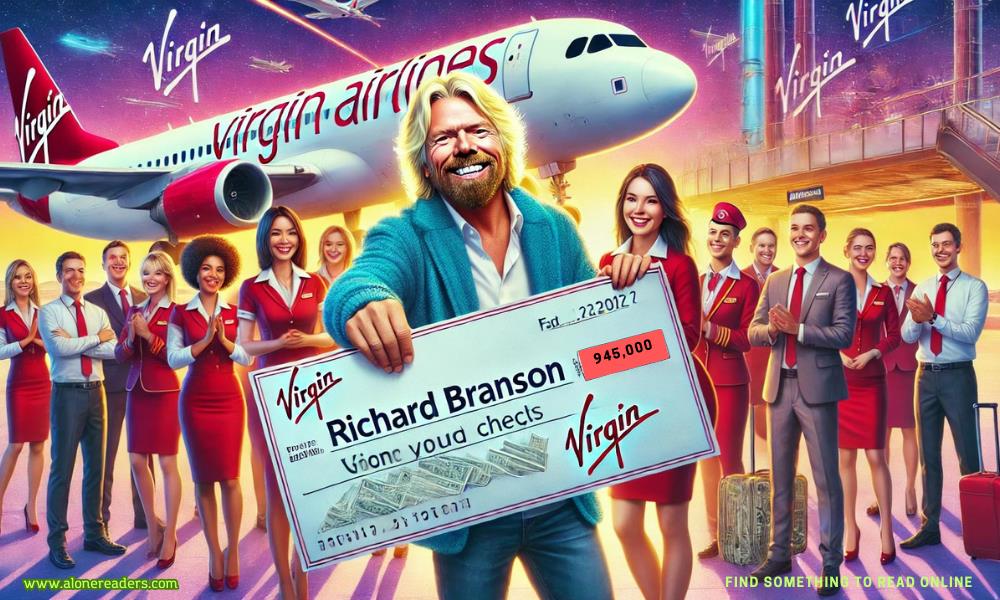
Virgin Airlines, led by the iconic British entrepreneur Richard Branson, has always been known for its unique and employee-centric approach. One particular instance that stands out is the time when Virgin Airlines won a lawsuit and secured a sum of $945,000. What made this moment truly remarkable was Branson’s decision to give the entire amount to his employees, reinforcing his reputation as a leader who values and cares deeply for the people who work for him.
The story began when Virgin Airlines found itself involved in a legal battle that eventually ended in a significant financial victory. The case itself, though important in legal terms, was just another moment of corporate contention. However, what happened afterward became a lasting testament to Richard Branson’s commitment to his team. Rather than pocketing the substantial settlement or reinvesting it into other areas of the company, Branson made the extraordinary decision to distribute every penny among his employees. This gesture set him apart from other business leaders, making headlines for the unusual but inspiring move.
For many, Richard Branson has long been viewed as more than just a successful businessman. He’s often described as a visionary and a leader with a strong ethical code, who genuinely believes that the success of a company is intertwined with the well-being of its employees. His leadership style emphasizes trust, respect, and recognition of employees' contributions. The decision to give away the lawsuit earnings reflected these values. It wasn't just about rewarding employees; it was about making a statement that their hard work and loyalty are recognized and appreciated.
Employees at Virgin Airlines were, of course, thrilled by the news. The unexpected windfall became a source of excitement and motivation within the company. For many, this kind of gesture was unprecedented, as corporations are typically seen as being profit-driven, often prioritizing shareholders or executive bonuses over employee rewards. But Branson’s decision was different, and it resonated across the company. Employees shared stories of how the money helped them pay off debts, take vacations, or save for future plans. For others, it simply reinforced their sense of pride in being part of a company that genuinely cared about them.
Branson’s actions also set a standard within the broader business community. He showed that taking care of employees can be just as important as any financial strategy. In a world where CEOs are often criticized for taking home massive salaries and bonuses while employees struggle, Branson’s move offered a refreshing contrast. It sparked discussions about corporate responsibility and the importance of recognizing the workforce as more than just numbers on a spreadsheet.
Virgin Airlines, under Branson’s leadership, has always emphasized an inclusive and supportive workplace culture. From the very beginning, Branson was determined to create a company where employees felt valued and motivated. The distribution of the $945,000 settlement was just one example of how Branson’s approach translated into tangible benefits for the workforce. He has been known to promote flexible work environments, offer unique perks to employees, and even advocate for initiatives like unlimited vacation time. For Branson, running a company was never just about making money; it was about building a community and ensuring that the people who contributed to Virgin’s success were recognized.
The impact of this decision also extended beyond Virgin Airlines. Other companies took note of how a major corporation could prioritize its workforce in such a meaningful way. Business leaders began to rethink how they could better support their employees, not just through salaries but through other forms of recognition and reward. Branson’s action became a case study in corporate ethics and the power of leadership that prioritizes people over profits.
This moment in Virgin Airlines' history is emblematic of Richard Branson’s broader philosophy as a leader. He has always championed the idea that businesses should have a positive impact on society, and that includes taking care of the people who help make the company successful. His decision to give away the settlement showed that a company’s success can—and should—be shared with those who work hard every day to make it happen. It also highlighted the kind of loyalty and dedication that can be fostered when employees feel valued.
Ultimately, Branson’s decision to give the $945,000 to his employees wasn't just an isolated act of generosity. It was a reflection of his leadership values, which have helped Virgin Airlines maintain its reputation as a forward-thinking, people-centered company. In an era where employees increasingly seek out companies that prioritize work-life balance, respect, and recognition, Branson’s example serves as a reminder that treating employees well is not only the right thing to do—it’s also good for business.